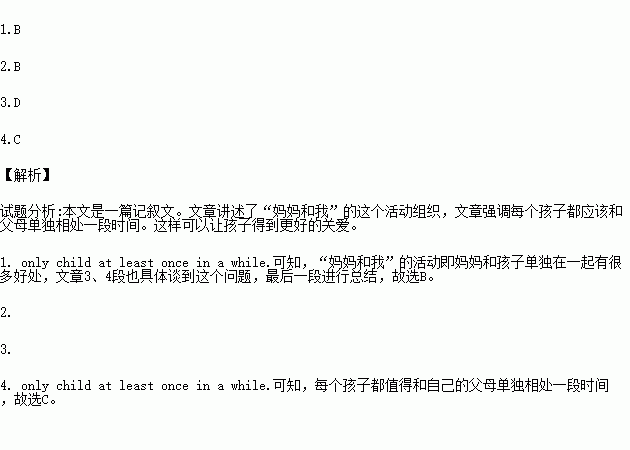题目内容
Our “Mommy and Me” time began two years ago. My next-door neighbor and fellow mother, Christie, and I were out in our front yards, watching seven children of age 6 and under ride their bikes up and down.“I wish I could take one of my children out alone,” said Christie.
Then we worked out a plan: When Christie takes one of her children out, I’ll watch her other three. And when she watches two of mine, I’ll take someone out.
The children were extremely quick to accept the idea of “Mommy and Me” time. Christie’s daughter, McKenzie, went first. When she returned, the other children showered her with tons of questions. McKenzie was smiling broadly. Christie looked refreshed and happy. “She’s like a different child when there’s no one else around,”Christie shared with me quietly. With her mother all to herself, McKenzie didn’t have to make an effort to gain attention.
Just as Christie had noticed changes in McKenzie, I also discovered something different in each of my children during our alone times. For example, I am always surprised when my daughter, who is seldom close to me, holds my hand frequently. My stuttering (口吃) son, Tom, doesn’t stutter once during our activities since he doesn’t have to struggle for a chance to speak. And the other son, Sam, who’s always a follower when around other children shines as a leader during our times together.
The “Mommy and Me” time allows us to be simply alone and away with each child-talking, sharing, and laughing, which has been the biggest gain. Every child deserves (应得到) to be an only child at least once in a while.
1.What is the text mainly about?
A. The experience of the only child being with mother.
B. The advantage of spending time with one child at a time.
C. The happy life of two families.
D. The basic needs of children.
2.Right after McKenzie came back, the other children were ______.
A. happy B. curious
C. regretful D. friendly
3.What is one of the changes the author finds in her children?
A. The daughter acts like a leader.
B. Sam holds her hand more often.
C. The boys become better followers.
D. Tom has less difficulty in speaking.
4.The author seems to believe that ______.
A. having brothers and sisters is fun
B. it’s tiring to look after three children
C. every child needs parents’ full attention
D. parents should watch others’ children

